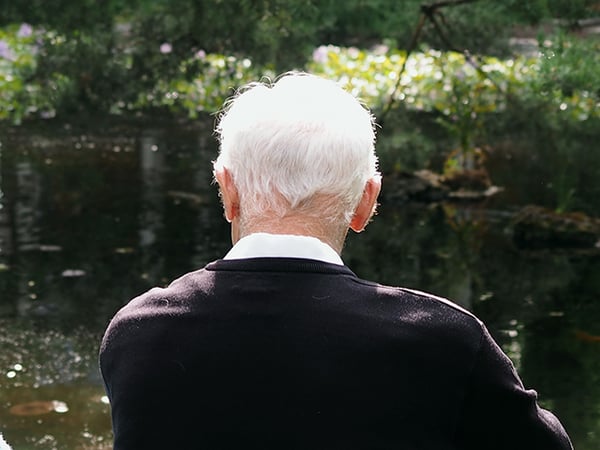Published: January 15, 2021
 The pandemic has forced us to hunker down at home and as a result, many of us find it easier to say something we might not have said a year ago: “I’m lonely.”
The pandemic has forced us to hunker down at home and as a result, many of us find it easier to say something we might not have said a year ago: “I’m lonely.”
“Loneliness is a natural normal response to what we are all going through,” says Baroness Diana Barren, U.K. Minister of Loneliness.
Yes, that’s right. Minister of Loneliness, a position Britain created before the pandemic. The UK began its loneliness outreach in 2018 after a report found that nine million of the country’s 67 million people feel lonely some or all of the time. Risk factors include chronic health problems and living alone, and now with the pandemic add limited access to digital technology to the list.
So now that the stigma of loneliness is being removed, let’s talk about loneliness and how you can help yourself and others.
What is Loneliness?
“In the 50 years from 1969 to 2019, the share of U.S. households of just one person grew from less than 17% to more than 28%, according to the National Academy of Sciences. Some 35 million Americans now live alone. Of course, some people living alone do so by choice and are quite happy. But many have been forced into social isolation, with serious effects on their health,” writes Timothy A. Smith for the American Medical Association.
Other causes of chronic loneliness may include change of school or job, a move to a new city, the end of a relationship or lack of meaningful connections, according to Healthline. They list these symptoms:
- decreased energy
- feeling foggy or unable to focus
- insomnia, interrupted sleep, or other sleep issues
- decreased appetite
- feelings of self-doubt, hopelessness, or worthlessness
- a tendency to get sick frequently
- body aches and pains
- feelings of anxiousness or restlessness
- increased shopping
- substance abuse
- increased desire to binge-watch shows or movies
- cravings for physical warmth, such as hot drinks, baths, or cozy clothes and blankets
Help for Yourself and Others
Pre-pandemic we found it fairly easy to get out and spend time with others. We could join a gym or sign up for exercise classes, volunteer with the local food pantry or a mentoring program, participate in neighborhood and family gatherings.
Now? Well it’s not so easy.
Experts recommend we embrace the cold and go outside, maybe join a local outdoor organization such as an arboretum or nature center. Also consider forming a COVID pod or bubble, such as several dozen Kendal at Oberlin residents have done.
Kendal residents have also been creative and come up with fun ways to be with others, such as playing music outdoors and in garages and putting together videos to share with family.
"Ideally, what we want to do is find solutions that help reduce the overall risk" — of social isolation and of catching and spreading COVID-19, says Julianne Holt-Lunstad, a psychologist at Brigham Young University who studies isolation.
Many of us are “zoomed out” but what about adding an activity such as a game, movie or shared meal to the virtual gathering.
"You get a lot more out of it than just kind of staring at each other in a relatively artificial way," says psychologist Vaile Wright, senior director of health care innovation at the American Psychological Association.
UK’s Loneliness Minister encourages people to write letters to those who live alone or may be lonely.
“Writing letters might be a slightly forgotten art but it’s more important than ever to connect with people, and putting pen to paper is an excellent way of making sure our friends, family and neighbors know we’re thinking about them,” she says.
Help for Older Adults Closer to Home
Telecare is a program of AmeriCorps Seniors’ Retired and Senior Volunteer Program (RSVP) and is available across seven Northeast Ohio counties. It aims to connect volunteers age 55 and older with older adults who want a friendly conversation or the reassurance of someone checking in on them.
If you know a senior who would benefit from Telecare, you can refer them online. You can also sign up to be a volunteer caller for RSVP if you are 55 years or older.
To counter isolation and loneliness due to the pandemic the Ohio Department of Aging created the Staying Connected Check-in Service. The Staying Connected service provides a free, daily check-in by phone for Ohioans age 60 or older.
You can sign up online or by calling 1-833-ODA-CHAT (1-833-632-2428).
To sign up, you will need the following information:
- Your name, year of birth, street address, phone number, and email (if available)
- The name of an alternate contact (if providing one), their relationship to you, and their phone number
- Your preferred one-hour contact window between the hours of 7 a.m. – 6 p.m.
 In the past, Molly Kavanaugh frequently wrote about Kendal at Oberlin for the Cleveland Plain Dealer, where she was a reporter for 16 years. Now we are happy to have her writing for the Kendal at Oberlin Community.
In the past, Molly Kavanaugh frequently wrote about Kendal at Oberlin for the Cleveland Plain Dealer, where she was a reporter for 16 years. Now we are happy to have her writing for the Kendal at Oberlin Community.
 Looking for a vibrant retirement living community that fits your future living plans? Schedule a tour with Kelly today.
Looking for a vibrant retirement living community that fits your future living plans? Schedule a tour with Kelly today. 




